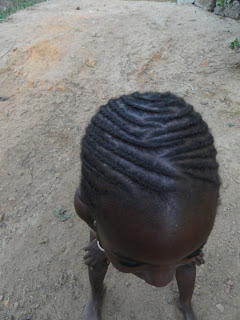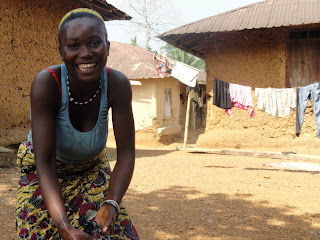Eventful moments:
When we return to Bonthe, we decide to visit the doctor because our health has not improved. The waiting room is a bench outside an open window that doesn't have glass or shutters, so it cannot be closed. Inside the window is the doctor who will call on each patient in order of who he would like to see first. When he calls on us and invites us to sit down, he shuts the door. He then announces to us that "what we say in here is just between us and it is confidential," which would make sense if there weren't currently four adult faces pressed up against the bars of the "window" listening and watching us intently...it's not every day that white people visit the doctor. (We did get better within hours of this visit)
On our boat ride back to Mattru Jong we see women preparing thousands of fish to sell when they arrive. People throw plastic bags over the side into the river casually. After two months neither Matt nor I can escape our cultural programming that tells us that littering is evil; we still cringe at the sight of trash in the beautiful river. Children use knives to open and eat mangoes--also a little nerve-wracking for me. We also chat with a religious reggae singer about politics and religion.
When people ask our age, there is much surprise and laughter when they calculate that I'm older than Matt.
When we arrive at the airport in Lungi with our tickets, ready to take off for Dakar, Senegal, we are informed that our flight will not take off, that in fact, Arik Air does not fly on Wednesdays at all! As you can imagine, we panicked. We have a connecting flight to catch on Thursday and the next Arik flight is on Friday!!! We are in Lungi, the airport town, several hours away from Freetown, where the nearest internet, ATM, or phone is for us to arrange alternative transportation. After drilling the airport staff about alternative flight options and begging to use their phone to talk to various knowledgeable people, we discover that if we rush back to Freetown and manage to book a new flight, get a visa for entering The Gambia, get a cash advance from the bank to pay for the flight, and get back to Lungi in time for the flight that night, we might be able to make it!
We did make our flight. We did make it to The Gambia at about 11pm at night. We then took a taxi to the ferry terminal. We caught the last ferry going across the river at midnight. Spent a couple hours sleeping in a guesthouse before getting a 'poda poda' bus to the Senegalese border. After all that went smoothly, all we needed to do was relax for the seven hour bus ride through Senegal to the capital city, Dakar. Phewph! I still can't believe it all worked out!! With a few hours to spare, even. We went back to our favorite market in the city, ate our favorite food, and relaxed as the sun set on the ocean before leisurely catching our flight to Paris, and then back to Seattle!
When we return to Bonthe, we decide to visit the doctor because our health has not improved. The waiting room is a bench outside an open window that doesn't have glass or shutters, so it cannot be closed. Inside the window is the doctor who will call on each patient in order of who he would like to see first. When he calls on us and invites us to sit down, he shuts the door. He then announces to us that "what we say in here is just between us and it is confidential," which would make sense if there weren't currently four adult faces pressed up against the bars of the "window" listening and watching us intently...it's not every day that white people visit the doctor. (We did get better within hours of this visit)
Gutting and scraping scales off of fish
On our boat ride back to Mattru Jong we see women preparing thousands of fish to sell when they arrive. People throw plastic bags over the side into the river casually. After two months neither Matt nor I can escape our cultural programming that tells us that littering is evil; we still cringe at the sight of trash in the beautiful river. Children use knives to open and eat mangoes--also a little nerve-wracking for me. We also chat with a religious reggae singer about politics and religion.
When people ask our age, there is much surprise and laughter when they calculate that I'm older than Matt.
When we arrive at the airport in Lungi with our tickets, ready to take off for Dakar, Senegal, we are informed that our flight will not take off, that in fact, Arik Air does not fly on Wednesdays at all! As you can imagine, we panicked. We have a connecting flight to catch on Thursday and the next Arik flight is on Friday!!! We are in Lungi, the airport town, several hours away from Freetown, where the nearest internet, ATM, or phone is for us to arrange alternative transportation. After drilling the airport staff about alternative flight options and begging to use their phone to talk to various knowledgeable people, we discover that if we rush back to Freetown and manage to book a new flight, get a visa for entering The Gambia, get a cash advance from the bank to pay for the flight, and get back to Lungi in time for the flight that night, we might be able to make it!
Cows, trucks, and passengers getting off of the ferry in The Gambia

















































